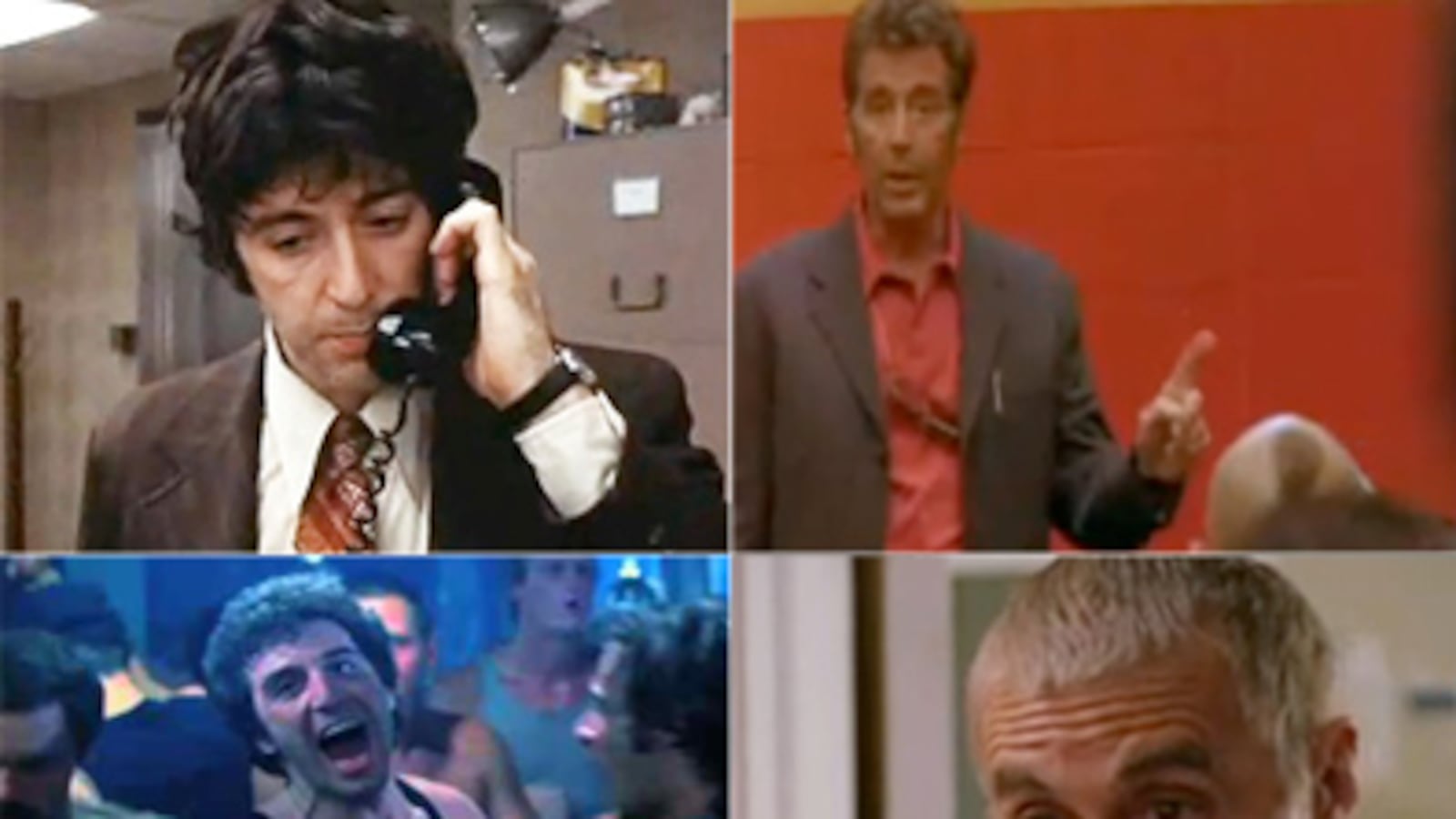Al Pacino did nothing more than raise his eyebrows and widen those dark eyes. But the gesture summoned a whole parade of characters from his past. The bank robber Sonny Wortzik of Dog Day Afternoon, the ruthless Tony Montana of Scarface, even bloodthirsty salesman Ricky Roma from Glengarry Glen Ross all walked inside that look, albeit with less ferocity than they once did.
Click the Image to Watch Video of Some Notable Pacino Performances, From Serpico to Angels in America

Pacino turns 70 on April 25. But even in this sedate setting—a luxury hotel suite overlooking Beverly Hills—there’s an innate agitation about him that hasn’t dimmed with age. He dresses a lot like Johnny Cash and on this day, his hair is standing up on end. And he is remarkably bronzed. The effect is striking. As Pacino speaks, his gravelly voice lends gravitas to every syllable. He can’t even help it.
His formidable brow, meanwhile, worked overtime as Pacino defended Jack Kevorkian, the controversial pathologist who—as it turns out—has inspired the actor to his best performance in years. He plays the doctor in HBO’s film You Don’t Know Jack, debuting Saturday. “Jack isn’t moralistic or righteous,” Pacino said. “It was self-determination. He was a doctor. The people he came in contact with were patients… They wanted him to be a physician so they could let go.… He turned away 97 percent of the patients who contacted him. Just knowing he was there eased their anxieties. His interest was always about saving lives.”
That is, the lives of those he wasn’t hastening toward a painless end with his nifty lethal-dose innovations. As antiheroes go, Kevorkian ranks near the top. It’s no surprise Pacino eagerly devoured this character. The doctor tested laws by euthanizing at least one patient in the back of his car. And when he was arrested for another assisted-suicide, he went on a 19-day hunger strike to make a point. He even let 60 Minutes broadcast a videotape depicting one patient’s last breath. In his spare time, Kevorkian fancied himself a painter, creating a gallery full of nightmarish images, sometimes incorporating his own blood. He never married. Lived a Spartan existence. And ultimately he served eight and a half years in prison. He was just what Pacino’s career needed.
“I didn’t feel I was too unhappy [playing Kevorkian],” Pacino said. “Other movies, I remember feeling I was in a pit and it was dark.”
“For me,” said Pacino, “it was always the opportunity just to be able to explore the whole idea of a zealot.”
Surprisingly, Pacino played the role without ever having met Kevorkian. It wasn’t, he said, like the time he worked with real-life whistleblower Frank Serpico on the 1973 Sidney Lumet classic about his life. Back then, the former cop hung around the film set giving the actor pointers. “I remember details he’d give me, scenes he would re-do for me,” said Pacino.
This time around, Pacino was alone with his own impressions. He spent weeks reviewing about 60 hours of Kevorkian’s videotaped patient consultations, honing his Michigan accent and cultivating empathy for Kevorkian’s cause. Pacino read Kevorkian’s books and studied his macabre paintings. But he stayed away from the doctor himself, who is on parole for second-degree murder. (Kevorkian, now 81, was released from prison in 2007.) “He was different from the guy I saw in the tapes,” said Pacino. “I wanted to just go with the glow I was feeling I had about Jack.”
After the film was done, director Barry Levinson had a copy sent to Kevorkian at his Michigan home. (The doctor doesn’t like to fly unless he must.) After Kevorkian watched it, Pacino called him up. (Not long after that, they met for dinner at Joe Allen restaurant in Manhattan, an event characterized by an HBO publicist as a “ love fest.” Exaggeration intended.)
“We just said ‘hello,’” Pacino recalled. “I heard that he had liked the picture. I said, ‘This is good.’ He was just gracious about it. He tried to put me at ease. …I told him what it turned out to be for me, playing him.… I didn’t feel I was too unhappy [playing Kevorkian]. Other movies, I remember feeling I was in a pit and it was dark. But this, I looked forward to engaging in this.”
Interesting that a man dubbed “Dr. Death” would conjure such warmth from Pacino. Then again, here’s an actor who famously launched his film and stage career depicting street punks, junkies, and heartless mob bosses. And perhaps, as a result, he earned five Oscar nominations in seven years as a young actor of the 1970s.
Over the last 15 years, though, Pacino has steered his career into a neighborhood made up largely of relative nice guys. He played grizzled football coaches ( Any Given Sunday), investigative TV producers ( The Insider), forensic psychiatrists ( Insomnia) and what feels like a squadron of veteran detectives. He hasn’t earned an Oscar nod in 18 years, since his double nominations for his turn as Ricky Roma in Glengarry Glen Ross and his portrayal of the blind and cantankerous Lt. Col. Frank Slade in Scent of a Woman, for which he won. And seven years have passed since his Emmy-winning portrayal of McCarthy-era prosecutor Roy Cohn in HBO’s adaptation of Angels in America.
Still Pacino is nothing if not ambitious. He wrote, directed, and starred in Wilde Salome as King Herod opposite Jessica Chastain, scheduled for release this year. And he’ll play another Herod opposite Camilla Belle in Mary Mother of Christ due out next year. Then he’s got a half-dozen other projects in development, casting him as King Lear, Salvador Dali, and Napoleon. From this vantage point, the Kevorkian film marks the dawn of a new phase for Pacino. The Era of the Zealot, perhaps?
Gina Piccalo spent a decade at the Los Angeles Times covering Hollywood. She's now a contributing writer for Los Angeles Magazine and her work has appeared in Elle, More and Emmy. She can be found at ginapiccalo.com.





